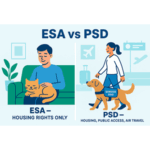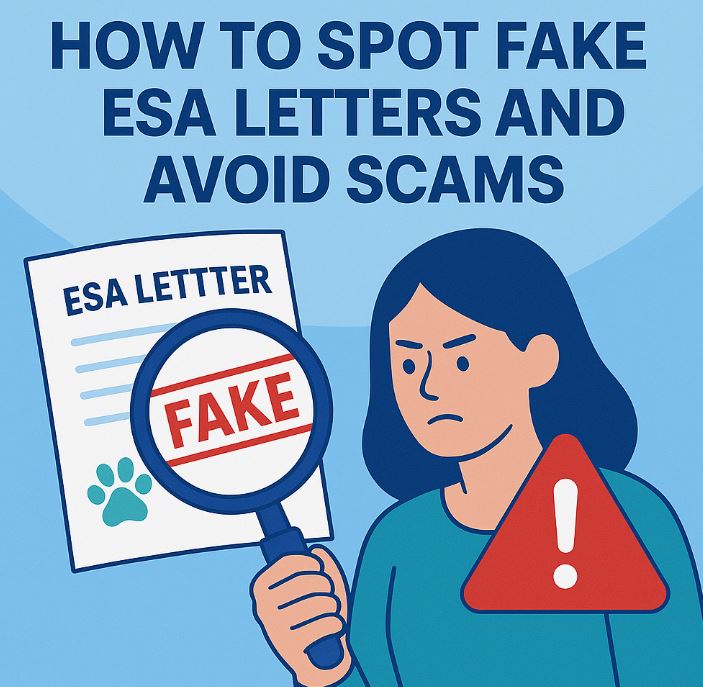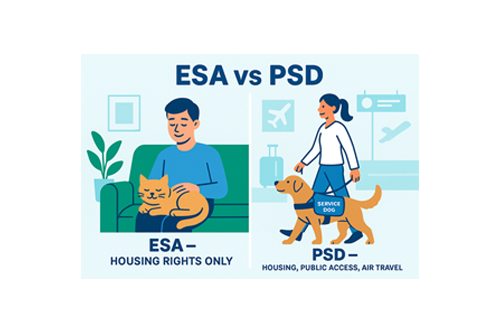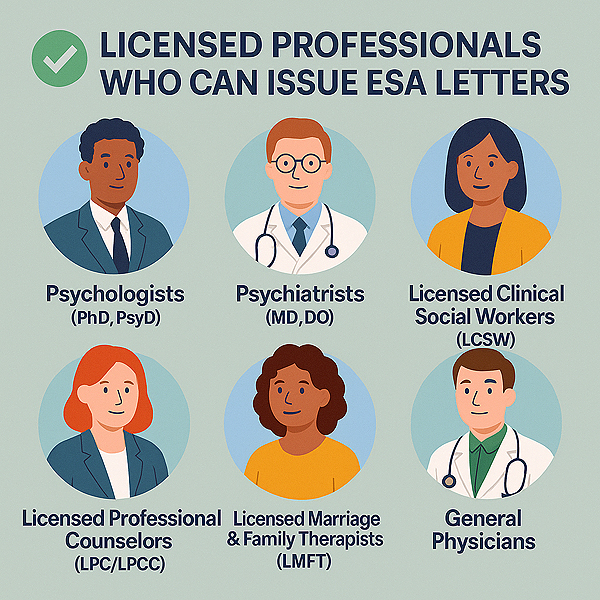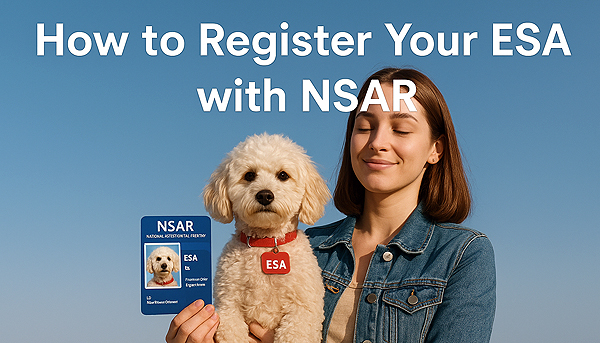ESA Letters for Housing: Everything You Need to Know

🐾 Why ESA Letters Matter for Housing
For most people, housing is the #1 reason to get an ESA letter. Imagine searching for an apartment only to find “no pets allowed” on every listing, or finally finding a place — but being asked to pay hundreds extra in pet deposits and pet rent.
With a legitimate ESA letter, you can:
- Override “no pets” rules
- Block pet fees and deposits
- Secure housing with your support animal legally protected under the Fair Housing Act (FHA)
👉 Without an ESA letter, your companion is just a pet. With one, they’re recognized as part of your treatment plan — and that changes everything.
📄 What Is an ESA Letter for Housing?
An ESA letter is a signed document from a licensed mental health professional (LMHP) stating:
- You have a qualifying mental or emotional condition
- Your animal provides therapeutic support
Unlike a pet note or casual letter from a doctor, an ESA letter is a formal medical recommendation tied to federal housing law.
Key Difference:
- Pet note = optional, may be rejected
- ESA letter = protected by federal law
⚖️ How ESA Letters Protect You Under the Fair Housing Act
The Fair Housing Act (FHA) requires landlords to make “reasonable accommodations” for tenants with disabilities. Emotional Support Animals fall under this protection. That means:
- ✅ Landlords must allow ESAs in “no pet” housing
- ✅ Landlords cannot charge pet rent, deposits, or fees
- ✅ Landlords cannot deny housing because you have an ESA
Example: If a landlord has a strict “no pets” policy, they must still allow your ESA once you present a valid ESA housing letter.
🕵️ What Landlords Can (and Can’t) Ask
Landlords Can Ask For:
- A copy of your ESA letter
- Verification that it comes from a licensed provider (no additional charge with NSAR – competitors often charge as high as $50 for “verification”).
- An updated letter (usually annually – discounted renewals with NSAR).
Landlords Cannot Ask For:
- Your diagnosis or detailed medical records
- A special registration certificate (the letter itself is sufficient)
- To charge pet deposits, pet rent, or fees
👉 Pro tip: If a landlord demands more than your ESA letter, you can politely remind them of FHA guidelines.
📬 How to Submit Your ESA Letter (Step-by-Step)
Submitting your ESA letter correctly can make the difference between a smooth approval and unnecessary conflict.
1. Prepare Your Documents
- Print your ESA letter (safe and secure through our online portal)
- Save a PDF version for email
- Have a copy of your provider’s license info (in case of verification)
2. Write a Simple Cover Note
Example:
Subject: Reasonable Accommodation Request – Emotional Support Animal
Dear [Landlord’s Name],
I am requesting a reasonable accommodation for my Emotional Support Animal under the Fair Housing Act. My ESA letter from a licensed mental health professional is attached.
Thank you,
[Your Name]
3. Submit Early
Send your request before move-in or lease renewal if possible.
4. Stay Professional
Keep all communication polite and in writing.
5. Follow Up
If you don’t hear back, send a reminder and request a written response.
🏠 From the Landlord’s Perspective
It helps to understand why landlords sometimes resist ESA requests.
Common Concerns Landlords Have:
- Abuse of ESA claims with fake letters
- Property damage
- Noise or safety issues
- Uncertainty about what they are legally allowed to ask
👉 That’s why having a legitimate ESA housing letter is so important. It reassures landlords that your documentation is valid and prevents unnecessary disputes.
🚫 When Can a Landlord Deny an ESA?
While landlords must generally accept ESAs, there are exceptions:
- The ESA poses a direct threat to health or safety
- The animal would cause significant property damage
- Allowing the ESA would cause undue financial/administrative burden
- The ESA letter is invalid or unverifiable
Example: A calm ESA dog with a legitimate letter must be approved. An aggressive dog that has bitten other tenants may be legally denied.
🎓 ESA Letters for College Dorms & Campus Housing
Your rights don’t stop at private housing. University dorms and campus apartments are also covered by the FHA.
- Schools must allow ESAs with valid letters
- They cannot charge pet rent or deposits
- Documentation often goes through the Disability Services Office
Case Example:
Maria, a college freshman with social anxiety, submitted her ESA letter from a licensed LPC in her state. The school verified it, and her ESA cat was approved to live in her dorm.

⚖️ State-Specific Rules to Know
In addition to the FHA, states may impose their own rules:
- California → Requires a 30-day relationship with the provider before issuing letters
- Florida → Submitting fake ESA documents can result in criminal charges
- Texas → Landlords can verify license info, but cannot request diagnosis
- Colorado → Allows rejection of unverifiable letters
- New York → Encourages landlords to validate licenses directly
- Illinois → Similar to NY, focuses on verification to prevent fraud
- Arizona & Washington → Recently updated ESA guidelines to align with FHA protections
👉 Knowing both federal and state rules keeps you ahead of disputes.
📖 Case Studies
Case 1: The Denied Fake Letter
David tried to use an “instant approval” ESA letter from a website. His landlord couldn’t verify the provider and denied the request. David later got a legitimate letter through NSAR and was approved.
Case 2: The Smooth Approval
Lisa submitted her ESA letter from a licensed psychologist. Her landlord checked the license in the state database, verified it, and approved her ESA within 48 hours.
Case 3: The College Student
Maria (from above) successfully brought her ESA into her dorm after providing a valid letter from an in-state LPC.
🚩 Common Mistakes That Lead to Rejection
- ❌ Using a letter from an unlicensed provider
- ❌ Submitting an old letter (over a year old)
- ❌ Forgetting provider license info
- ❌ Requesting accommodation verbally without documentation
- ❌ Assuming ESAs have public access rights (they don’t — only housing protections)
📝 ESA Housing Checklist
- ESA letter from a licensed professional
- Provider license number & state included
- Letter signed & dated (within 12 months)
- Cover note requesting accommodation
- Digital + printed copies ready
- Communications documented
❓ FAQs About ESA Letters for Housing
Do ESA letters expire?
Not by law, but most landlords require renewal every 12 months.
Can landlords charge a cleaning fee?
They cannot charge upfront pet fees, but they can charge for actual damages beyond normal wear and tear.
What if roommates object?
Landlords must still make reasonable accommodation, but they may balance roommate health/safety needs.
Can condos or HOAs deny ESAs?
Generally no — they are also covered under the FHA.
🔮 The Future of ESA Housing Rights
As demand for ESAs grows, more states are tightening rules to prevent fraud. At the same time, housing providers are becoming more familiar with ESA laws — and more skeptical of questionable letters.
That’s why working with trusted services like NSAR is critical. We connect you with licensed providers who issue legitimate ESA housing letters that landlords accept.
🎯 The Bottom Line
Your ESA letter is the key to housing security. With it, you can override no-pet policies, block fees, and ensure your support animal stays by your side.
But it must be legitimate. Don’t risk rejection with a fake or incomplete letter.
👉 Get your ESA housing letter through NSAR today — and protect your housing rights with confidence.
Going through life with an emotional or mental disability can be difficult enough. But when you are trying to find a place to live with your ESA, things can get even trickier. Some landlords are not welcoming to pets, even when they play such a vital role in their owner’s lives. Thankfully, people with emotional support animals have legal rights to fair housing. Keep reading below to learn everything you need to know about the Fair Housing Act, and how it can impact you and your ESA during your home search.


